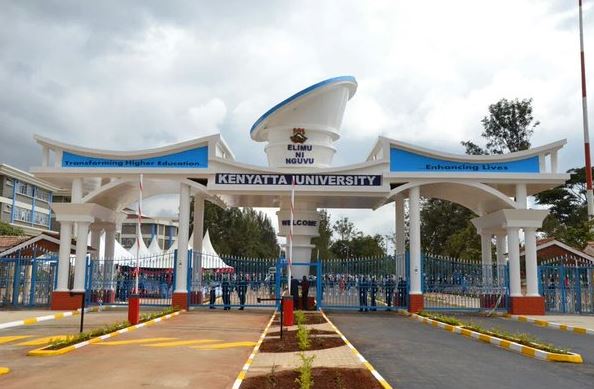
Hello and welcome to the Money News Roundup Newsletter. Today, we’re covering the planned job cuts and satellite campus closures in universities. We also cover the latest trends in the real estate sector in Nairobi.
What We Are Doing This Week: We are working (and playing around) with Lua, a free AI Assistant available on Whatsapp, that can generate images, schedule meetings, churn out creative content with a Kenyanised arch, and the results are astonishing. Try Lua today by visiting here, or participate in our Ksh5,000 reward challenge using Lua to imagine how Nairobi would be in 2040. (Below is an image submitted by Deb Muthoni, a participant). Deadline for submisions in 30 July.

Universities Face Mass Layoffs and Closures of Satellite Campuses
Treasury Cabinet Secretary John Mbadi has hinted at plans for layoffs in public universities.
As reported by Citizen Digital, the CS expressed that funding of public universities was unsustainable, explaining that the government would be forced to take radical measures such as job cuts.
He added that the universities would close satellite campuses and outsource non-essential services.
"The Ministry of Education, in collaboration with universities, is expected to develop a comprehensive reform strategy that will ensure financial sustainability within public universities.
“One, restructure public universities to reduce unnecessary administrative costs and measures of staff right-sizing and outsourcing of non-core services, and rationalising satellite campuses to dispose of such assets to offset pending financial obligations, among others,” Mbadi announced.
On the other hand, he announced that the government could not pay capitation for all students owing to low budgetary allocations. Out of the expected Ksh22,244 for high school students, the government can only pay Ksh16,900.
Auditor General Raises Alarm Over New University Funding Model
Still on education matters, the Auditor General, Nancy Gathungu, has uncovered irregularities in the higher education funding model, exposing a system that denies deserving students vital support.
Her report for the year ending June 2024 highlights critical failures, including the allocation of money to students who had deferred studies.
As detailed in the Business Daily, other revelations included the lack of integration between the funding model and the KUCCPS system.
This crippling disconnect means seamless student tracking is impossible, leading to some receiving funds prematurely before official university placement, while others are unjustly left out due to administrative errors.
Why It Might Get Harder for Kenyans to Borrow Money From Banks
Moody’s has warned that Kenya’s heavy reliance on domestic borrowing is likely to crowd out private sector credit.
The Treasury plans to raise nearly two-thirds of its financing from local sources, increasing pressure on banks to favor government securities.
According to the Business Daily, Moody’s says this strategy risks worsening debt affordability. Kenya’s weak tax base, large exemptions, and high informal employment limit revenue collection.
“Kenya will rely predominantly on the domestic market to meet its fiscal financing needs with approximately two-thirds of its financing, or just under 4 percent of GDP per year, from domestic sources,” Moody’s said.
Govt Proposes Law to Regulate KUSCCO-Like Groups After Ksh13 Billion Scandal
National Assembly's Leader of Majority leader Kimani Ichung'wah has proposed a law that will regulate groups SACCOs form such as the Kenya Union of Savings and Credit Cooperatives (KUSCCO).
As detailed in the Sacco Societies (Amendment) Bill, 2025, SACCOs will be allowed to form secondary SACCOS, which will be regulated and licensed by the Sacco Societies Regulatory Authority (SASRA). However, the minimum membership will have to be 30.
In the proposal, the secondary SACCOS will be allowed to take deposits from its members and invest in government securities.
The groups will also be allowed to offer short-term lending to members of SACCO societies and facilitate lending between the members.
Read the coverage here
Nairobi Estates Where Landlords Have Dropped Rent
Rental prices in Nairobi’s suburbs and satellite towns dropped marginally in the second quarter of 2025, according to Hass Consult’s latest Property Price Index.
Between April and June, areas such as Muthaiga, Westlands, Kilimani, and Runda recorded rent drops of 2.7%, 1.7%, 1.2%, and 0.1% respectively. Overall, rental prices contracted by 0.2% during the quarter, reversing a 0.3% rise in the first quarter.
As detailed by Kenyans.co.ke, Hass Consult Co-CEO Sakina Hassanali linked the decline to tough economic conditions, which have made tenants more price-sensitive.
As a result, landlords are holding off on rent increases to retain tenants. On the other hand, areas like Lang’ata, Gigiri, and Kileleshwa saw rent increases, with Lang’ata recording the highest growth at 3.4%.
Join 1.5M Kenyans using Money254 to find better loans, savings accounts, and money tips today.

Money 254 is a new platform focused on helping you make more out of the money you have. We've created a simple, fast and secure way to find and compare financial products that best match your needs. All of the information shown is from products available at established financial institutions that our team of experts has tirelessly collected.

